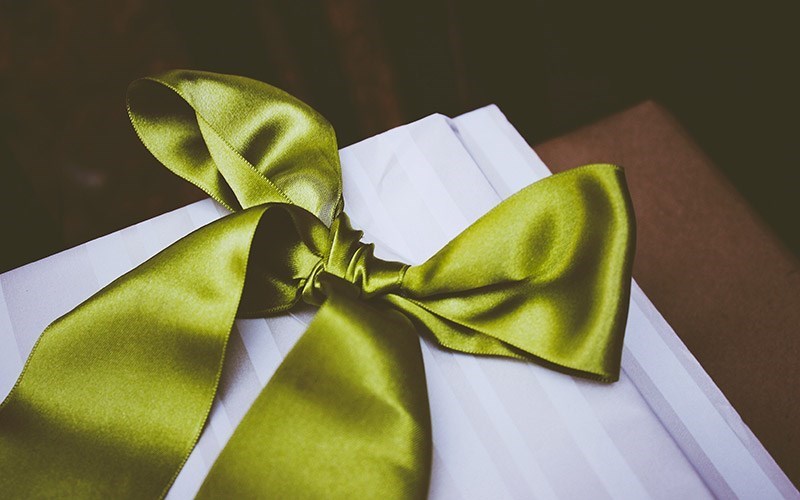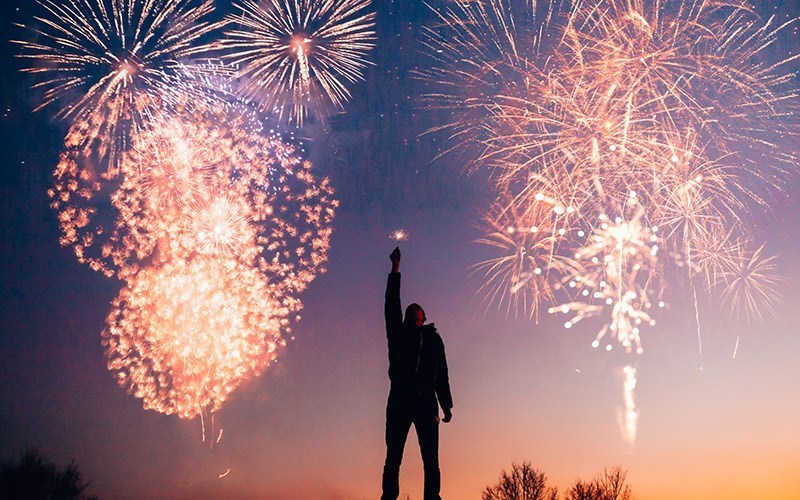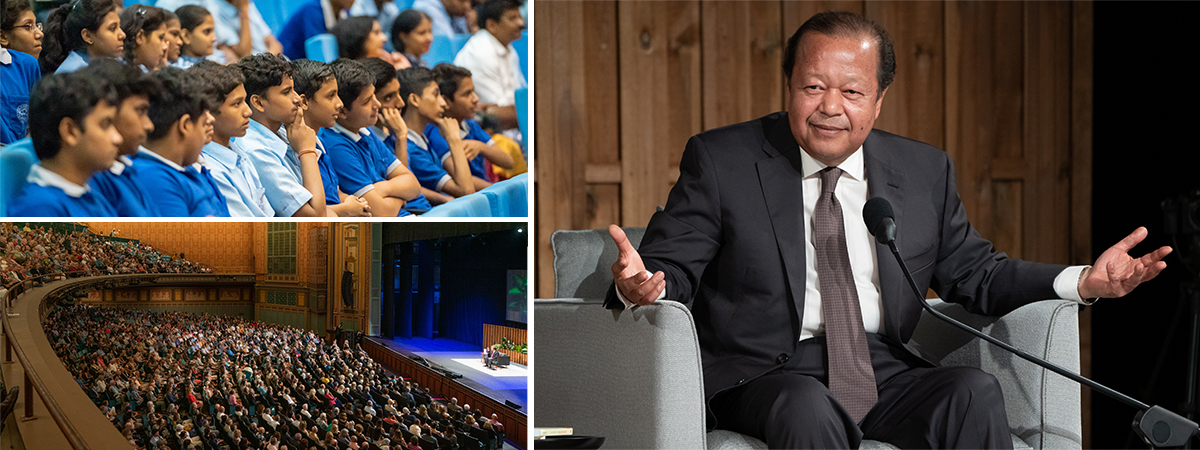Topics
 00:03:49
Know For Yourself
Video
Duration : 00:03:49
There are some things in life that you need to know for yourself.
00:03:49
Know For Yourself
Video
Duration : 00:03:49
There are some things in life that you need to know for yourself.
Don’t sit on your living room sofa while somebody’s knocking at the door going, “I wonder who that is. It could be Uncle Tom. It could be my friend Jerry. It could be my friend from India—no, and no, he wouldn’t do.... Hmmh, I wonder who it is? Let me call Prem Rawat! ‘Who is at my door?'"
So, go find out! This is what I’ve said. All along, people have said, “Oh, wha’, wha’, wha’...?” Go find out. Know for yourself. Know it for yourself. And that’s being victorious over the self. You make the rules. You make the rules.
Not just somebody’s.... And, do you know how many people there are in this world who have swallowed the idea of heaven, the heaven that you go to after you die, if you’ve done everything right? Swallowed it, “gulp!” How you could swallow such a big horse pill, I don’t know. But you swallowed it—without water.
Oh.... Heaven? There is a heaven—of course there is a heaven. It’s here. And you need to know it! And so, what is hell? Well, if you don’t know it—and you’re not in heaven—guess where you are! And do you get toasted? Yes, you get toasted. Raked over the fire, absolutely—again and again.
And there you are. One day you find yourself totally devastated and destroyed. And somehow you’re put back together again, to have the same experience two days later? Same exact thing: fried, toasted, not any flour, not any oil, just dry-toasted over the great barbecue that you light yourself, that you create yourself. And that’s what happens.
So, the victory over the self: most important, most important. And it’s not so complicated; it’s not sophisticated; it’s not like, “He’eeah-heeeaah, victory over myself."
No—because it’s very simple. First, you begin by knowing yourself. Now that you know yourself, easy to gain victory over yourself. This is not about swords and dragons. This is about, "very simple, very practical."
- Prem Rawat
 00:07:05
Sword of Forgiveness
Video
Duration : 00:07:05
Forgiveness is to sever the relationship with an action that is dragging you dow...
00:07:05
Sword of Forgiveness
Video
Duration : 00:07:05
Forgiveness is to sever the relationship with an action that is dragging you dow...
MC: [Graeme Richards]
One of the questions that was posed is, “If forgiveness is difficult for you to begin with—forgiving someone else is hard enough—turning it inward to the person that you know better than anyone else, the person that you probably judge more than anyone else—how do you forgive yourself?”
Prem Rawat:
Well, that’s a wonderful question. Because that is so important, to be able to forgive yourself. And let’s just not even bring “you and somebody else” into the picture. Let’s just talk about forgiveness, what “forgiveness” is.
And a lot of people think “Forgiveness is granting license to mediocrity, granting license to somebody’s mistake.” That is not forgiveness. “Forgiveness” is to sever the relationship with that action that is dragging you down.
So, now, whatever—and, you know, somebody did something to you that was terrible. And that happened a long time ago. But, that person still has a clutch on you. They still have a clutch on you. Because every day that you wake up, perhaps, and in a solitary moment, you curse that person; you think of that person; that person is still connected to you.
And forgiveness is saying, “No more. You will not have control over me. I want my life back. I want my life back, and I do not authorize you, any more, to haunt me.” That’s what forgiveness is.
So, it’s not going around saying, “Oh, yeah, I, I, I know you, you....” I mean, uh! And this is the way I see it. This is the way I see it. I mean, one time a horrible thing happened to me. And then, every time I would think about it, it was like, “Oh, my God, oh, my God, oh, my God.”
And then I just said, “You know, that little punk still has control over me. And I’m not even in his country anymore. And I’m not going to let him have control over me.” And I said, “That’s it. Gone!”
That’s what forgiveness is. Forgiveness is very powerful. It’s really saying, “No, I’ve got my life. Thank you very much.”
Regaining—it’s regaining. Because, if you don’t, then the clutches will still be there. And what it does to you—what this clutching does to you, these claws that are buried inside of you, to infuriate you—it causes anger; it causes fear; it causes you to shut down; it causes you to stop moving forward; it stops appreciation.
And you live in fear. You live in fear! And that person is gone, but the clutches are still there. And it’s saying, “No more, thank you!”
And when you start to look at forgiveness that way, it takes on a whole different meaning. Because, up till now it’s been, it’s like, “Oh, uh, I, I forgive you, and you know, it’s okay. Eh, and you did this to me, and it’s like....”
But you know, there are things that can happen to you in this life that, if you are talking about acceptance of somebody’s actions, it’s not going to happen. It’s just not going to happen! Because you cannot accept some of those actions. They are so heinous!
And you cannot allow yourself to be a victim. Some of the things, you will never be able to say, “Oh, yeah, I’m fine with that.” But! It’s up to you whether you allow the talons of that person and that activity still to be gripping you. Because if you don’t, then use the sword of forgiveness and free yourself. You move on.
So that’s how I see forgiveness. Not saying, “Oh, yeah, okay, you did this.” Because, some of the actions are so heinous! And you see that. You see that happening, so many places.
Another way to understand this is, one day Buddha was out walking, and all these people were saying very bad things about him. So his disciple who was with him came back, and he said, “Buddha, all those people were doing terrible things, saying terrible things to you. Aren’t you affected by that?”
And Buddha said, “Okay, well, see this bowl? Whose bowl is it?” It was Buddha’s bowl. And he said, “Yeah, it’s your bowl!” So then he took the bowl and he scooted it towards his disciple a little bit. He says, “Whose bowl is it now?” The disciple said, “It’s still your bowl.” He scooted it a little closer. “And whose bowl is it now?” Scooted it in a little closer. “Whose bowl is it now?”
He kept going like that, and then finally he took the bowl and put it in his disciple’s lap. He said, “Whose bowl is it now?” He says, “Buddha, it’s still your bowl.” He said, “Exactly. Exactly! I don’t have to accept this. The day I do, it becomes my bowl. But if I don’t, it’s still theirs.”
You know, and I understand—I mean, sometimes these stories are easier said than actually translated into your life, but at least, if you begin to chisel away....
I mean, maybe the rope is so thick that you won’t be able to cut it in one day. But at least, you start severing it, start understanding the dynamics—that you have the power to sever that rope, that this is what forgiveness means.... That, ultimately one day you will weaken that rope; that it will, it’ll be severed.
But you need to begin. You need to start understanding that.
- Prem Rawat
 00:02:01
Your Gift of Choice
Video
Duration : 00:02:01
This creation has given a gift to you: it’s called “life.” If you don’t accept i...
00:02:01
Your Gift of Choice
Video
Duration : 00:02:01
This creation has given a gift to you: it’s called “life.” If you don’t accept i...
If somebody gives you a gift—if somebody gives you a gift and you don’t accept it, whose gift is it anyways? It’s not a tricky question; I’m not trying to trick you. It’s just a straightforward question: “If somebody gives you a gift and you don’t accept it, whose gift is it anyways?”
I mean, it’s simple as this. Here’s a handkerchief; it’s my handkerchief. If I give it to you and say, “Here,” and you say, “No,” whose handkerchief is it? [Audience: Yours.] Thank you. That’s what I thought, too. I was starting to have doubts.
And I use it two ways. Somebody says something bad to you; that’s their gift to you. If you don’t accept it, whose is it? Theirs; not yours. So that’s one thing.
How about the other way? This creation has given a gift to you: it’s called “life.” If you don’t accept it, whose is it? Not yours. Not yours—or should it be yours? If you want it to be yours, you have to accept it. And once you accept it, you will understand what it is.
– Prem Rawat
 00:01:49
Our Strength
Video
Duration : 00:01:49
If we make the choice to be fulfilled, we make the choice to be in that heaven h...
00:01:49
Our Strength
Video
Duration : 00:01:49
If we make the choice to be fulfilled, we make the choice to be in that heaven h...
What makes you human? Human. And what makes you human is your humanity! And if you don’t know what that humanity is, then you will never understand what it is about, what is life, what is this time, what does being here mean.
Because there is another possibility. And the other possibility is that we make the choice to capture the day, that we make the choice to be fulfilled, that we capture the choice, we make the choice to be in that heaven here, now!
Instead of being victimized, we begin to understand our own strength—our own strength, each one of us. That it is not about other people; that it’s about me. That I need to live in this world, and I need to experience! Not just think, experience! Experience.
– Prem Rawat
 00:01:31
The Ultimate Culprit
Video
Duration : 00:01:31
A simple thing called “not listening”—that is the culprit in the world, in my op...
00:01:31
The Ultimate Culprit
Video
Duration : 00:01:31
A simple thing called “not listening”—that is the culprit in the world, in my op...
The very things that break down the structure of a family, a simple thing called “not listening”—that is the culprit in the whole world, in my opinion. The government doesn’t listen to the people; the people don’t listen to the government. Wife doesn’t listen to the husband; husband doesn’t listen to the wife. Children don’t listen to the parents; parents don’t listen to the children.
No listening. Why? Because there’s so much noise already going on, of everything that’s wrong. It is the Tom Thumb syndrome. We have become so small, and everything has become so big—that you no longer understand.
You don’t understand who you are; you don’t understand why you’re here; you don’t understand what your potential is; you don’t understand what the breath means; you don’t understand what your choices are. You have a choice. You can choose.
– Prem Rawat
 00:03:19
The Grand Party
Video
Duration : 00:03:19
You have no other choice; you’ve got to live every single day to its full.
00:03:19
The Grand Party
Video
Duration : 00:03:19
You have no other choice; you’ve got to live every single day to its full.
There is something constant. And all the days you’re going to be alive on the face of this earth—all the days—how many are there? Even if you live to be a hundred years old, how many days is that? Thirty-six thousand, five hundred. Take 365, put two zeros at the end, right?
I know I can see disbelief in some of your faces, like, “Whoa, whoa, what, you’re missing a zero. It has got to be three hundred and sixty-five thousand. Couldn’t just be thirty-six thousand, five hundred.”
But unfortunately, or fortunately, that’s all it is—and a big chunk of it is gone. And I only say this, not to scare you, but to provide the spice of urgency of how important it is for you to know yourself, so that the rest of the days that you exist are spent existing to your fullest potential. You have no other choice; you’ve got to live every single day to its fullest—and that’s not “party.” That’s the grand party, the party in which you are happy!
You’re not happy because you are with your friend, but yet, you are happy because you know yourself. You are happy because you have the courage to understand. You are happy because you have chosen, by your own choice, the fifty percent that’s good in you. And you have chosen to tame the fifty percent that’s bad in you.
That you have chosen, you have made a choice in your life to be real. That you have made a choice in your life to find the joy of being alive, to find the joy of existence, to find the joy of understanding, to find the joy of what it really feels like to have courage to know.
– Prem Rawat





